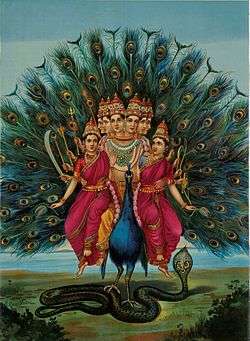Devaraya Swamigal
Devaraya Swamigal (born c. 1820) was a Tamil devotee of Lord Muruga. He is best known for his composition of the Tamil hymn Kanda Shasti Kavasam.
Devaraya Swamigal | |
|---|---|
| Personal | |
| Born | c. 1820 |
| Religion | Hinduism |
| Philosophy | Kaumaram |
| Religious career | |
| Guru | Shree Thirisipuram Meenakshi Sundaram Pillai |
| Literary works | Kanda Shasti Kavasam |
| Honors | Tamil Poet |
| Part of the series on |
| Kaumaram |
|---|
 |
|
Six sacred abodes
|
|
Biography
Not much is known about Devaraya Swamigal. He is believed to have been born between 1820 and 1830 in an affluent family. His father Shree Veeraswami Pillai served as Dubash of Mysore under the British rule, owning properties in Bangalore. Devaraya Swamigal's ardent inclination towards the Tamil language resulted in his learning the language under Shree Thirisipuram Meenakshi Sundaram Pillai, a pundit from Tiruchy. Soon he started writing poems, with his teacher editing and correcting them.[1]
Devaraya Swamigal eventually wrote six hymns, popularly known as kavachams or kavasams (literally meaning "armour"), the most popular of which is the Kanda Shasti Kavacham. The other kavasams are Siva Kavacham, Shanmuga Kavacham, Shakthi Kavacham, and Narayana Kavacham.[2] Apart from these, he also wrote Kuselopakyaanam, Thanigasala Maalai, Panchaakara Desigar Pathigam, and Seda Maalai.[1]
See also
References
- Alagesan, Serndanur Ramanathan (2013). Skanda Shasti Kavacham (in Tamil and English) (4th ed.). Sivakasi, Tamil Nadu: Nightingale. pp. 3, 10–11. ISBN 978-93-80541-08-2.
- M. Arunachalam (2005) [1972]. தமிழ் இலக்கிய வரலாறு, பன்னிரண்டாம் நூற்றாண்டு (Tamil Ilakkiya Varalaru, 12th century) (Volume 1) [Tamil]. Chennai: The Parker, Tamil Research and Publishing Group, Chennai.
| Wikisource has original text related to this article: |